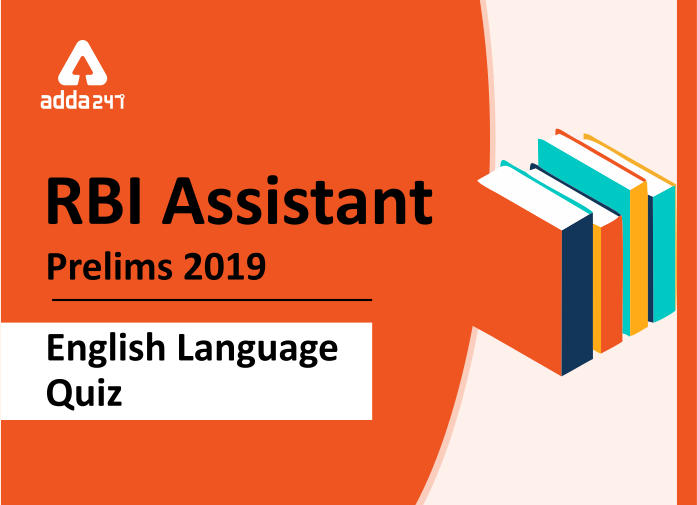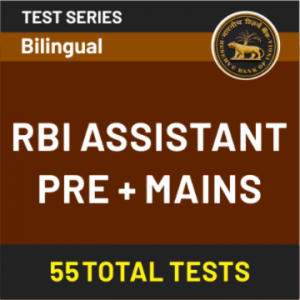Reserve Bank of India has brought you one golden opportunity and has announced “RBIAssistant recruitment 2020” on January 16, 2020, with 926 posts. So to grab this opportunity bankersadda brings you the daily mock of ‘RBIAssistant Prelims English Daily Mock 11th January 2020. Today we have the English Practice Set. Keep in touch with bankersadda to get daily English Quiz and boost your preparation for the upcoming bank exam. You can also prepare with the study plan for RBI Assistant available bankersadda website.
Directions (1-5): In each of the questions given below a sentence is given in which some parts are given in bold which are grammatically correct. The other three parts of the sentence may or may not be grammatically correct. The sentence is then followed by three alternatives for the parts of the sentence which is not given in bold which may replace the incorrect portion. Choose the alternative(s) which will replace the incorrect part in the sentence to make it grammatically and contextually correct.
Q1. After he had read/ the two first chapters/ of the novel, / he felt like reading/ the book at one sitting.
[I] the first two chapters
[II] in the novel
[III] the book on one sitting
(a) only [I]
(b) only [II]
(c) only [III]
(d) both [I] and [III]
(e) No correction required
Q2. Would have they waited / even a week to start /advocating for change, / the reporters would/ have been gone home.
[I] Had they waited
[II] advocating over change
[III] have gone home
(a) only [I]
(b) only [II]
(c) only [III]
(d) both [I] and [III]
(e) No correction required
Q3. To consider our own history, / surely compassion is/ infinitely preferable than our/ first step being to fine and forcibly /remove Venezuelans seeking our help.
[I] Considering our own history
[II] infinitely preferable to our
[III] first step being too fine and forcibly
(a) only [I]
(b) only [II]
(c) Both [I] and [II]
(d) All [I], [II], [III]
(e) No correction required
Q4. You will meet not only / colleagues who you’ve never / met but also interact with / people regardless of where / in the hierarchy they stand.
[I] Not only will you meet
[II] met yet also interact with
[III] people regarding of where
(a) only [I]
(b) only [II]
(c) Both [I] and [II]
(d) All [I], [II], [III]
(e) No correction required
Q5. Reserve Bank of India, as the / authority on capital flows in the country, / is privy to information on the outward remittances / of both individuals / and Indian companies.
[I] authority on capital flowing in the country
[II] is privy for information on the outward remittances
[III] of both individual
(a) only [I]
(b) only [II]
(c) Both [I] and [III]
(d) All [I], [II], [III]
(e) No correction required
Directions (6-10): Each sentence is followed by the three expressions which may or may not contain grammatical errors. Choose the most appropriate alternative among the five options which states the incorrect part(s) of the sentence. If the given sentence is grammatically correct and contextually meaningful, choose option (e) i.e., “No error” as your answer.
Q6. Ram had an endless, kind of a constant desire to keep on moving and keep on doing things.
(I) Ram had an endless,
(II) kind of a constant desire
(III) moving and keep on
(a)Only (II)
(b)Only (III)
(c)Both (I) and (II)
(d)Both (II) and (III)
(e)No error
Q7. While there is pollution during winter and there is no denying that, it is doubtful whether the city can be ranked the fourth most polluted globally during summer and monsoon.
(I) there is no denying that,
(II) it is doubtful whether the city can be
(III) ranked the fourth most polluted
(a)Only (II)
(b)Only (III)
(c)Both (I) and (II)
(d)Both (II) and (III)
(e)No error
Q8. The fund will predominantly comprise of institutional investors, complemented by select set of large family offices and a couple of new domestic institutions.
(I) The fund will predominantly comprise of
(II) select set of
(III) a couple of new domestic institutions
(a)Only (II)
(b)Only (III)
(c)Both (I) and (II)
(d)Both (II) and (III)
(e)No error
Q9. They prefer the term “plant-based” than “vegan” when describing a diet that avoid meat, dairy or any animal products.
(I) the term “plant-based” than “vegan”
(II) when describing
(III) that avoid meat, dairy or any animal products.
(a)Only (I)
(b)Only (III)
(c)Both (I) and (III)
(d)Both (II) and (III)
(e)No error
Q10. A return visit by Mr. Modi to Nepal within a month indicates that both sides are keen to show positive movement.
(I) A return visit by
(II) within a month indicates
(III) are keen to show positive movement.
(a)Only (I)
(b)Only (III)
(c)Both (I) and (III)
(d)Both (II) and (III)
(e)No error
Directions (11-15): Rearrange the following five sentence (A), (B), (C), (D) and (E) in the proper sequence to form a meaningful paragraph and then answer the questions given below.
(A) In fact, what’s worrying is that some of these expensive plants may end up being liquidated because lenders would resist selling them at big haircuts, fearful of being questioned by the investigative agencies.
(B) What is more important, however, is that it won’t really solve the issues faced by these plants and will, at most, help postpone the day of reckoning.
(C) Which is why union power minister RK Singh is trying to convince RBI it should provide lenders some forbearance for these assets.
(D) Whether the central bank will make exceptions for one sector is not clear.
(E) With over 40,000 MW of power plants already unviable for want of fuel or power purchase agreements (PPAs), and likely to be sold for a song if they turn into non-performing assets on banks’ books and end up in the NCLT, it is understandable the government is seriously concerned.
Q11. Which among the following statements becomes the FIRST sentence of the paragraph after rearrangement?
(a) A
(b) B
(c) D
(d) C
(e) E
Q12. Which among the following statements becomes the LAST sentence of the paragraph after rearrangement?
(a) A
(b) B
(c) D
(d) C
(e) E
Q13. Which among the following statements becomes the THIRD sentence of the paragraph after rearrangement?
(a) A
(b) B
(c) D
(d) C
(e) E
Q14. Which among the following statements becomes the SECOND sentence of the paragraph after rearrangement?
(a) A
(b) B
(c) D
(d) C
(e) E
Q15. Which among the following statements becomes the FOURTH sentence of the paragraph after rearrangement?
(a) A
(b) B
(c) D
(d) C
(e) E
Solutions
S1. Ans. (a)
Sol. The error is in the second part of the sentence as one of the important rules for a grammatically correct sentence structure says that when in a sentence Ordinal adjective such as first, second, third, last etc. and cardinal adjective such as one, two, three, four etc., are present together, then the cardinal adjective must follow the ordinal adjective. Eg. “The first five questions.”. However, the other parts of the sentence comprehend the grammatical syntax of the sentence and are correct and do not require any changes. Thus, option (a) becomes the most viable choice.
S2. Ans (d)
Sol. To correct the first and third part of the sentence, replace “would have they wanted” with “Had they wanted” and “have been gone home” with “have gone home” respectively as to express an unfulfilled condition, desire, wish of past “Had+subject+V3, Subject + would/ could/ might/ should + have + V3” syntax is used. The conditional perfect is formed using would have together with the past participle of the main verb. It refers to an impossible condition in the past and its probable result in the past. Other part of the sentence is grammatically correct and doesn’t require any changes. Therefore, with the given rationale option (d) is the most viable choice.
S3. Ans. (d)
Sol. All the three parts comprise either grammatical or contextual error in them. In the first part replace “To consider our own history” with “Considering our own history” to eliminate the contextual error. ‘to consider’ means to think about (something or someone) carefully especially in order to make a choice or decision while ‘considering’ can be used as a preposition or conjunction which means taking into consideration. In the second part of the sentence replace “than” with “to” as for the words like ‘preferable, senior, junior, superior, inferior, posterior’ “to” is used. The word prefer itself means choosing one thing over another and as per grammatical usages, generally prefer is used when two nouns are referred Eg. I prefer tea to coffee. Moreover, in the third part of the sentence “to” should be replaced with “too” to make the sentence logical and meaningful. “to” as a preposition means approaching or reaching (a particular condition); while “too” is an adverb which means to a higher degree than is desirable, permissible, or possible; excessively. Hence, as all the three parts contain error in them option (d) becomes the most viable answer choice.
S4. Ans. (a)
Sol. To make the syntax of the sentence grammatically correct replace “You will meet not only” with “Not only will you meet”. “Not only” should be used before “meet” and not after. As “Not only…But also” is used to connect two subjects, objects or verbs. It means that the words following both parts of this correlative conjunction (i.e., not only and but also) should belong to the same parts of speech. For example, if a verb follows not only, then a verb should also follow but also. The other parts of the sentence do not contain any error in them, therefore, option (a) becomes the most suitable answer choice.
S5. Ans. (e)
Sol. The given sentence is both grammatically and contextually correct. The sentence is in simple present tense and the syntax followed is precise. Therefore, none of the parts requires any changes. Hence, option (e) becomes the most feasible answer choice.
S6. Ans. (d)
Sol. There is an error in part (II) and (III) of the sentence.
Remove ‘a’ before constant. After ‘Kind of’, ‘type of’, ‘sort of’, ‘variety of’, ‘rank of’, ‘post of’ etc. we don’t use an article before the noun.
However, for interrogative sentences we can use ‘a/an’.In part (III) since keep on is already used the sentence will be keep on moving and doing things.
S7. Ans.(a)
Sol. The error is in only the part (II) of the sentence.
Use ‘that’ in place of whether as we use ‘that’ after ‘doubt’ and ‘doubtful’ if the sentence is Affirmative ‘Negative’ or ‘Interrogative’. If the sentence is Assertive Affirmative we use ‘if’ and whether.
S8. Ans.(c)
Sol. The error is in part (I) and (II) of the sentence.
In part (I) of the sentence the error is in the use of ‘of’. We will not use ‘of’ after ‘comprise’ as comprise = consist of.
In part (II) The noun phrase ‘select set’ seems to be missing a determiner before it. Consider adding an article ‘a’ before it.
S9. Ans.(c)
Sol. The error is in part (I) and (III) of the sentence.
In part (I) remove ‘than’ and replace it with ‘to’ because when we use prefer to compare two nouns or gerunds then after ‘prefer’ we use the preposition ‘to’
In part (III) use ‘avoids’ in place of ‘avoid’ as the subject ‘diet’ is singular and therefore the verb must be singular.
S10. Ans.(e)
Sol. There is no error in the given sentence.
S11. Ans. (e)
Sol. The correct sequence of the sentence after the rearranging them to form a coherent paragraph is EACDB. Hence, option (e) is the most suitable answer choice.
S12. Ans. (b)
Sol. The correct sequence of the sentence after the rearranging them to form a coherent paragraph is EACDB. Hence, option (b) is the most suitable answer choice.
S13. Ans. (d)
Sol. The correct sequence of the sentence after the rearranging them to form a coherent paragraph is EACDB. Hence, option (d) is the most suitable answer choice.
S14. Ans. (a)
Sol. The correct sequence of the sentence after the rearranging them to form a coherent paragraph is EACDB. Hence, option (a) is the most suitable answer choice.
S15. Ans. (c)
Sol. The correct sequence of the sentence after the rearranging them to form a coherent paragraph is EACDB. Hence, option (c) is the most suitable answer choice.
RBI Assistant 2020 | A, An, and The Articles | English For RBI Assistant Preparation
Register here to get study materials and regular updates!!
All the Best BA’ians for RBI Assistant Prelims




 English Language Quiz For Bank Foundatio...
English Language Quiz For Bank Foundatio...
 English Language Quiz For SBI Clerk Prel...
English Language Quiz For SBI Clerk Prel...
 English Language Quiz For SBI Clerk Prel...
English Language Quiz For SBI Clerk Prel...


